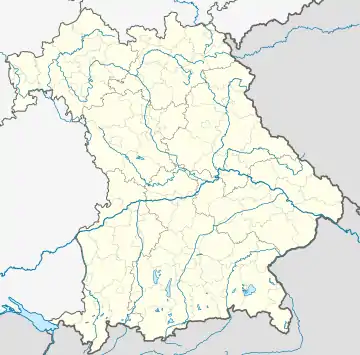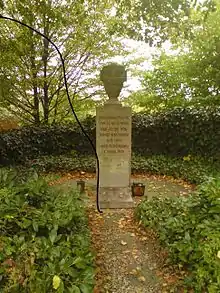Saal an der Donau
Saal is a municipality in the district of Kelheim in Bavaria in Germany. It is located along the banks of the Danube River, around 25 km southwest of Regensburg.
Saal a.d.Donau | |
|---|---|
 Church of Christ, the King | |
 Coat of arms | |
Location of Saal a.d.Donau within Kelheim district  | |
 Saal a.d.Donau  Saal a.d.Donau | |
| Coordinates: 48°53′N 11°55′E | |
| Country | Germany |
| State | Bavaria |
| Admin. region | Niederbayern |
| District | Kelheim |
| Municipal assoc. | Saal an der Donau |
| Subdivisions | 15 Ortsteile |
| Government | |
| • Mayor (2020–26) | Christian Nerb[1] (FW) |
| Area | |
| • Total | 44.03 km2 (17.00 sq mi) |
| Elevation | 346 m (1,135 ft) |
| Population (2022-12-31)[2] | |
| • Total | 5,614 |
| • Density | 130/km2 (330/sq mi) |
| Time zone | UTC+01:00 (CET) |
| • Summer (DST) | UTC+02:00 (CEST) |
| Postal codes | 93342 |
| Dialling codes | 09441 |
| Vehicle registration | KEH |
| Website | www.saal-donau.de |
Ortsteile
Villages affiliated to the administration (Ortsteil) of Saal are
- Buchhofen
- Reißing
- Mitterfecking
- Peterfecking
- Oberfecking
- Einmuß
- Seilbach
- Oberschambach
- Unterschambach
- Oberteuerting
- Unterteuerting
- Kleinberghofen
- Gstreifet
- Kleingiersdorf
- Felsenhäusl
History
The first settlements in Regensburg date back to the ages of the Hallstatt culture.
Saal was first mentioned in a document in 1002. Apparently Saal was at that time owned by Henry II, then Duke of Bavaria, and given to the Niedermünster Abbey in Regensburg.
Already around 1530, the Thurn und Taxis family started to run a post-house in Saal. The German poet Johann Wolfgang von Goethe stopped during his journey to Italy on September 5, 1786, at 15h in Saal for swapping horses at the post-house. The post horn featuring the coat of arms of Saal today still reminds of this tradition.[3]

During World War II, a subcamp of the Nazi concentration camp Flossenbürg, named Ringberg Me, was installed nearby the street connecting Saal and the neighboring village Teugn. The goal was to construct an underground arms industry plant for Messerschmitt, a German aircraft manufacturer. At peak times more than 600 men were imprisoned in the subcamp. After the war 20 bodies and the ashes of about 360 people were found.
References
- Liste der ersten Bürgermeister/Oberbürgermeister in kreisangehörigen Gemeinden, Bayerisches Landesamt für Statistik, 15 July 2021.
- Genesis Online-Datenbank des Bayerischen Landesamtes für Statistik Tabelle 12411-003r Fortschreibung des Bevölkerungsstandes: Gemeinden, Stichtag (Einwohnerzahlen auf Grundlage des Zensus 2011)
- Haus der bayerischen Geschichte about the coat of arms of Saal